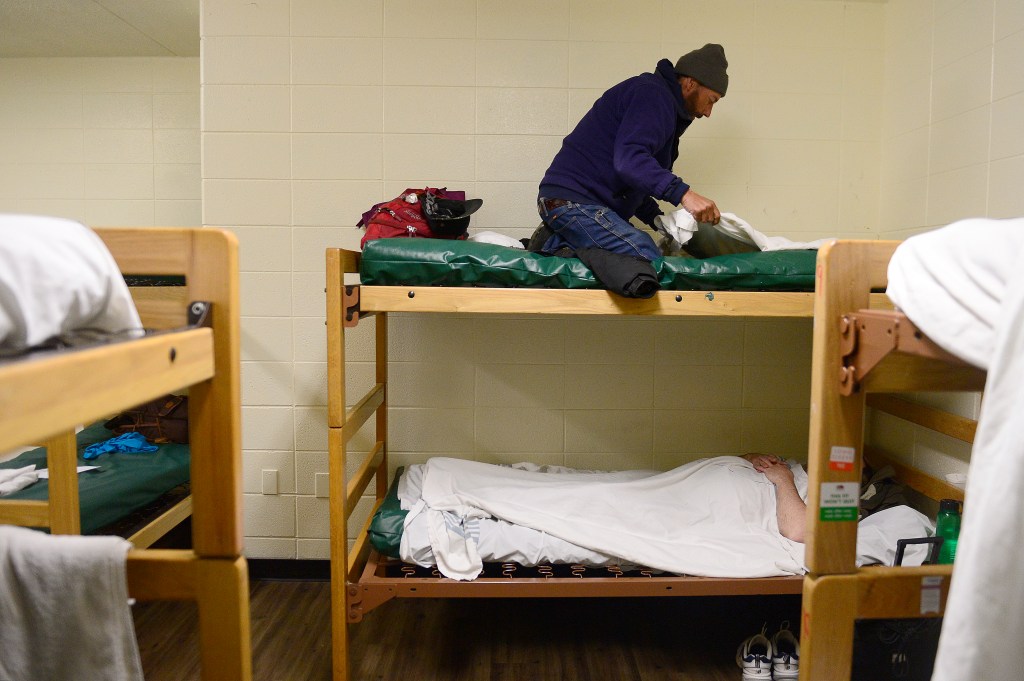Comitis Crisis Center, the only homeless shelter of its kind in Aurora, will pivot away from providing beds to single adults Oct. 31, focusing instead on serving families experiencing homelessness.
“It was always hard for us every winter, stacking up families in the building, because we only had the one little section,” said Bob Dorshimer, CEO of the shelter’s parent organization, Mile High Behavioral Healthcare.
“There’s always been a need for a family shelter that was much bigger than what we could provide, and we’re able to provide that now for east Denver, Adams and Arapahoe counties.”
Funding sources and strategies for addressing homelessness in Aurora have fluctuated in recent years as the city works to open its own “homeless navigation campus” next to Denver’s Montbello neighborhood.
Dorshimer said converting most of the Comitis building on the outskirts of the University of Colorado Anschutz Medical Campus into a family shelter is one way Mile High is playing to its strengths.
The organization has been working to expand its offerings for children and families, opening its Family Preservation Center in north Aurora to serve young people living in poverty along East Colfax Avenue earlier this year.
However, Aurora’s City Council has also rolled back its financial support of the organization, cutting grant funding and declining to backfill the difference last winter when the retail marijuana sales that were taxed to fund those grants declined.
Dorshimer said the lost marijuana tax dollars largely went toward Comitis’ services for single adults, in addition to funding from Adams and Arapahoe counties, the State of Colorado and private foundations that will sustain the shelter’s new primary mission of aiding families.
“There might be a void in one area, but the good part is we just filled in the other,” he said
The new void will look like a worse scarcity of shelter beds for single adults that aren’t contingent on their participation in a specific program or services as temperatures fall.
While Comitis will continue to operate up to 20 beds for single adults accessing substance abuse treatment or medical respite, Dorshimer said the shelter is referring current clients to locations outside of Aurora, since “there isn’t a shelter in Aurora.” At the moment, Comitis has about 75 unrestricted beds.
City of Aurora spokesman Matt Brown said the city’s navigation campus is tentatively scheduled to open in late 2025. Emergency cold-weather shelter will continue to be offered at the Aurora Day Resource Center, which since Oct. 1 has been managed by the homelessness service provider Advance rather than Mile High.
Advance was awarded a $2 million contract last month to operate the city’s navigation campus.
Brown also said the city’s cold-weather outreach team will continue to help the city’s homeless residents access emergency shelter.
Comitis will close in November as the shelter prepares to accept families, Dorshimer said. It will reopen Dec. 1, with an emergency family shelter on one floor and temporary housing for families on another floor.
Unlike other family shelters, Dorshimer said Comitis will accept teenage boys and adult men, setting it apart from some similar shelters in the Denver metro area and reflecting the organization’s desire to keep families together.
Before it closes at the end of the month, Dorshimer said Comitis staffers plan to hold a “goodbye dinner” with current shelter clients.
“We’re going to let them know that we’re always going to be here for them,” he said.
Get more Colorado news by signing up for our daily Your Morning Dozen email newsletter.


